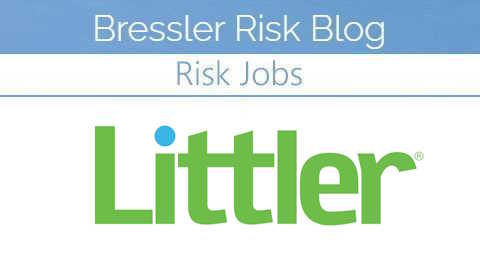BRB Risk Jobs Board — Conflicts Analyst (McNees)
Posted onIn this BRB jobs update, I’m pleased to highlight an open role at McNees: “Conflicts Analyst” —
- McNees Wallace & Nurick has an immediate opening for a Conflicts Analyst for Remote work.
- This position supports Conflicts and Firm Counsel in promptly responding to all new business requests submitted firm wide, including requests related to existing and potential new clients as well as requests related to new hires and requests for proposal. The conflicts analyst is called upon to communicate complicated information, handle multiple complex situations, and produce high quality work in a timely manner. The primary responsibility of the Analyst is to provide analysis and guidance regarding conflicts of interest as it relates to new business and new talent.
ESSENTIAL FUNCTIONS/RESPONSIBILITIES:
- Conflicts Analysis. Analyze conflict reports for new business and potential new hires, as well as RFPs, and communicate effectively and confidentially with internal clients to maintain a responsive and thorough conflicts onboarding process for new talent and new business.
- New Business Intake: Work with other Department members by responding in a timely manner to requests. Incorporate information from emails, comments, and phone conversations to ensure that all known information about new business is fully incorporated in the analysis process.
- Database Management: Correct inconsistent party information on requests as submitted. Assist with identification of additional parties based on information from various sources. Identify and perform large-scale projects to reconcile party information in the conflicts database. Discover new ways to manage data and submit enhancement requests to vendors as necessary.
- Systems Maintenance: Field questions from staff and attorney users regarding intake/conflicts software. Work closely with Department members to provide comprehensive conflict/intake training with all new hires and on an ongoing basis to Firm employees. Maintain detailed instructional training documents catered to different audiences. Coordinate with inter-departmental design team to identify areas for improvement with vendors and follow up with testing to verify changes within the system.
- Miscellaneous: Recommend process/service improvements, solutions, policy changes and/or major variations from established policy to better meet the needs of both internal and external clients. Ensure that services are delivered effectively and efficiently; ensure compliance with Firm policies and procedures; assist in the development of office or department procedures and processes; attend regular staff meetings and training; work effectively with other departments and work groups, including timely follow-up and frequent communications. Exercise independent judgment and discretion. Assist with a wide range of research projects as necessary.
- Other duties as assigned
ESSENTIAL CAPABILITIES:
- Must be able to leverage firm and department resources to provide a timely and thorough response to all incoming inquiries; produce quality work that upholds the expectations set by the goals of the Department; work independently and efficiently.
- Must be able to listen and respond to all inquiries in a professional and sensitive manner and navigate various communication styles to effectively deliver analysis and give advice that is informed, objective, and succinct. Must be able to handle sensitive or difficult issues with confidence and professionalism; leverage technology to maintain an appropriately lean operation and promote efficiency across the firm.
EDUCATION & EXPERIENCE:
- Bachelor’s degree required. Law firm and conflicts of interest analysis or related risk management initiatives and familiarity with Upfront, Intapp, or other conflicts database software preferred.
See the complete job posting for more details on the job and to apply for this position.
About McNees:
McNees is a full-service law firm with offices in Devon, Harrisburg, Lancaster, Pittsburgh, Scranton, State College, and York, PA; as well as Columbus, OH; Frederick and Towson, MD; and Washington, DC. We pride ourselves on our team approach to practicing law, and we encourage work-life balance and community involvement. We offer a collegiate and inclusive culture, competitive salary, range of benefits, and local community involvement.
All qualified applicants will receive consideration for employment without regard to age, race, creed, color, national origin, ancestry, marital status, affectional or sexual orientation, gender identify or expression, disability, nationality or sex.
And if you’re interested in seeing your firm’s listings here, please feel free to reach out…










